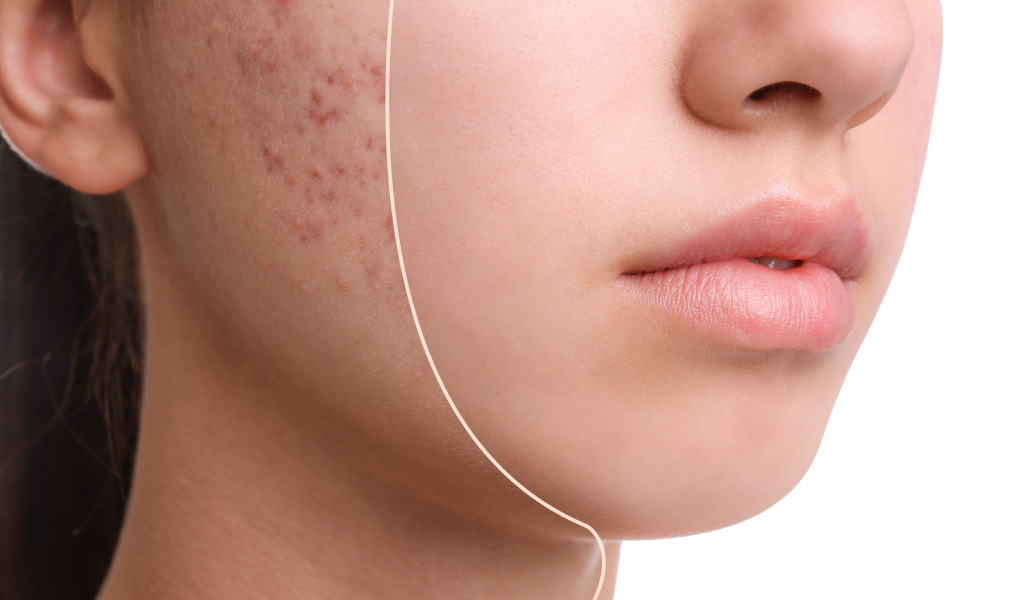Success Stories
Targeting Acne at Its Root



For decades, acne has been treated as a cosmetic concern, managed with creams, cleansers, and, in more severe cases, strong medication. But inflamed pores are more than just skin deep. Researchers found that the skin microbiome, and various immune dysfunctions, play a role in causing those pesky whiteheads. However, these factors are still poorly understood, and rarely addressed by existing treatment.
A new partnership between French multinational pharmaceutical company Sanofi, the Agency for Science, Technology and Research (A*STAR) and the National Healthcare Group’s (NHG) National Skin Centre (NSC) is working to change that. Based in Singapore, the collaboration brings together clinical and scientific expertise to revolutionise acne treatment—starting with a first-in-class therapeutic vaccine candidate and a comprehensive translational study.
Acne remains one of the most common skin conditions worldwide, estimated to affect roughly 9.4% of the global population. Yet the standard of care has changed little in decades. As perception of one’s appearance is increasingly associated with mental health, the need for safer, longer-lasting solutions is indeed important. To accomplish this goal, the collaboration aims to target the biological mechanisms of acne instead of its symptoms.
This research project is particularly meaningful as it is being conducted in Asian patients. By focusing on this group, the collaboration fills a gap in the research and can lead to a better understanding of the differences between the skin microbiomes of Asian and Western populations.
“Singapore is also unique as the research here will provide insights into the condition in a multi-ethnic society,” said Professor Rachel Watson, Executive Director, A*STAR Skin Research Labs (A*STAR SRL).
Using an immune-based approach for a chronic skin condition
Sanofi’s acne vaccine candidate is based on the idea that the skin’s microbiome can be rebalanced in a way that allows the immune system to target problematic strains of Cutibacterium acnes, the bacteria that causes zits to surface.
“Current treatments can be effective, but they often come with trade-offs—antibiotic resistance, poor tolerability and long treatment timelines,” said Kirsten Schneider-Ohrum, Sanofi Global Project Head, Vaccines Research Portfolio. “We’re exploring a vaccine-based approach that goes deeper, one that modulates the immune response to shift the skin microbiome back to a healthier balance.”
Unlike isotretinoin (found in existing acne medicines) or broad-spectrum antibiotics, which can make healthy skin flora go off kilter and require frequent blood tests, the vaccine aims to prompt a targeted response against acne-associated bacterial strains. This could potentially reduce flare-ups and lessen reliance on repeat treatments. To validate this approach, Sanofi sought clinical and research collaborators with deep expertise in immunology and skin biology.
Singapore as an integrated, mature biomedical innovation hub
Sanofi chose to base its modular manufacturing facility and this R&D programme in Singapore due to the latter’s capabilities as a biomedical innovation hub. “Singapore offers a unique combination of scientific infrastructure, clinical excellence and a proactive innovation ecosystem,” said Schneider-Ohrum. “We want to make it a Centre of Excellence in both pharmaceutical and vaccine development in Asia.”
The partnership with A*STAR and NSC builds on these national strengths. NSC’s acne clinic and subspecialty expertise provide the clinical foundation for the Phase I/II trial, while A*STAR contributes capabilities in microbiome science and immune profiling.
The three organisations are already launching two studies: a Phase I/II clinical trial for young adults with mild acne, and a translational study to examine immunological and microbial pathways that contribute to acne progression.
For Dr Etienne Wang, Senior Consultant at NSC, NHG and Principal Investigator for the trial, the project’s significance is clear. “We haven’t seen a major breakthrough in acne treatment since isotretinoin was approved over 40 years ago,” he said. “And while it works for many, its side effects, especially in adolescents, mean we urgently need better alternatives.”
“By analysing immune markers and microbiome profiles, we hope to gain a richer understanding of acne’s pathology. That opens the door to more targeted and safer treatments,” he added.
Collaboration in multidisciplinary endeavours
From study design to execution, the partnership shows the importance of nurturing public-private partnerships, where MNCs, research institutes and public healthcare institutions work together to address real-world health challenges and make real-world impact.
“Biomedical research today is far too complex and advanced to be done in siloes,” said Dr Wang. “It takes multidisciplinary perspectives, from clinicians, microbiologists, immunologists and data scientists. Singapore’s integrated ecosystem allows us to bring these together efficiently.”
Since the MOU was signed in November 2024, protocols are being finalised, with the Phase I/II trial set to begin in Q2 2025. The translational study will follow later in the year. Researchers are also working to define new clinical endpoints for mild acne, which is an area not well captured by current frameworks.
“By combining Sanofi’s pharmaceutical innovation, A*STAR’s cutting-edge scientific research and NHG’s clinical expertise through NSC, this partnership aims to advance acne treatment through a holistic and multidisciplinary approach,” said Annie Joseph, Technology Business Director, A*STAR SRL.
Excitingly, Sanofi has indicated that its R&D footprint in Singapore may continue to grow. “Singapore is a key partner with an advanced healthcare ecosystem, and we remain open to exploring various partnerships and collaborative opportunities,” Zainab Sadat, General Manager, Vaccines Southeast Asia and India.
A*STAR celebrates International Women's Day

From groundbreaking discoveries to cutting-edge research, our researchers are empowering the next generation of female science, technology, engineering and mathematics (STEM) leaders.
Get inspired by our #WomeninSTEM
